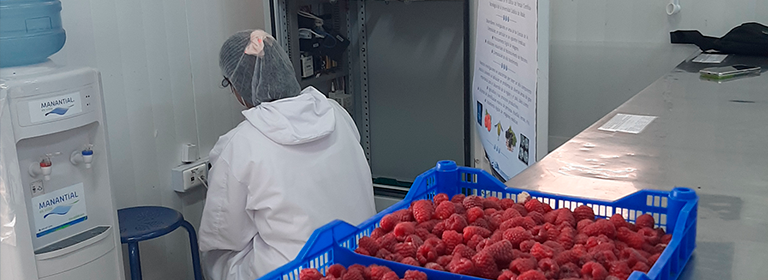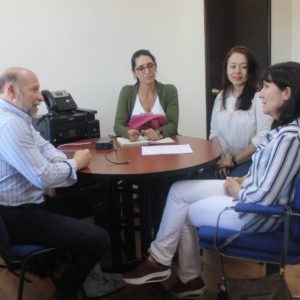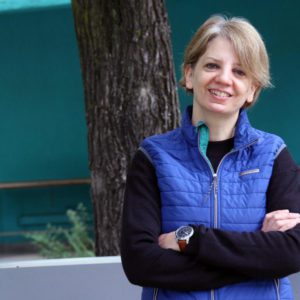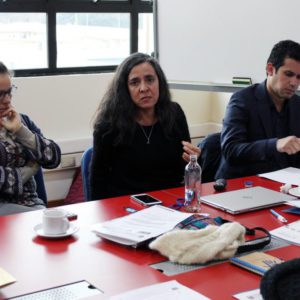The National Institute of Industrial Property (INAPI, by its initials in Spanish) granted exclusivity certificates to the formulation of a sausage made with apple skin and pulp and a device capable of estimating the quality of export raspberries with artificial intelligence.
 Not one but two invention patents were obtained by Universidad Católica del Maule (UCM) for its most recent innovations in agribusiness. The National Institute of Industrial Property (INAPI, by its initials in Spanish) granted certificates of exclusivity to a food product, consisting of a sausage with apple pomace, and to an unprecedented device that estimates the quality of fruits with artificial intelligence.
Not one but two invention patents were obtained by Universidad Católica del Maule (UCM) for its most recent innovations in agribusiness. The National Institute of Industrial Property (INAPI, by its initials in Spanish) granted certificates of exclusivity to a food product, consisting of a sausage with apple pomace, and to an unprecedented device that estimates the quality of fruits with artificial intelligence.
«We wondered what we could do with the pomace that remains from the apple after making juice, and we came up with the possibility of generating a sausage that incorporates fiber, vitamins, and minerals and defies the black or warning seals for its high-fat content,» said its creator, Nelson Loyola.
The professor of the Faculty of Agricultural and Forestry Sciences of the campus, inventor of the equally patented «Cherry Burger», said that now it is possible to dream of a healthy “choripán”, a type of sandwich with chorizo popular in Chile.
«The product has meat, which can be pork, beef, or chicken, reduced calories, and a unique taste, like the cherry burger. It is not sweet because it is cooked and pasteurized. Part of the sweetness is lost during dehydration,» he explained.
The unique “longaniza” was born in 2018 at the Center for Studies in Processed Foods (CEAP), where the academic worked as an associate researcher alongside Professor Carlos Acuña, representing UCM.
 «I humbly take this since when a person emerges, many people emerge with them. In this case, a student took the idea as part of his thesis in Agronomy, and with this work, he got his degree,» said the agronomist by profession.
«I humbly take this since when a person emerges, many people emerge with them. In this case, a student took the idea as part of his thesis in Agronomy, and with this work, he got his degree,» said the agronomist by profession.
For Marco Mora, Ph.D. in Computer Science, his invention, which also passed INAPI’s novelty and industrial application requirements, particularly benefits fruit growers.
«The fruit in the packing house is sampled manually, with a human expert hired by the company, through a visual inspection. Our equipment allows us to automatically and objectively estimate the quality of the raspberries, utilizing software that removes subjectivity from the declaration of a fair price for the producer. Ultimately, the system has a social objective for the more than 1,200 people whose family economy depends on raspberries,» he said.
The device, developed as part of a project financed by the Maule Regional Government’s National Competitiveness Innovation Fund, «recreates visual characteristics of objects, very similar to what the human brain does.»
“Images of the raspberry trays are captured in a controlled environment with diffuse light. Inside a cubicle that is like a refrigerator,» said the professor. Each of the raspberries in the tray is detected, and it is determined whether or not they are defective and what defect they have. We took the raspberry because it is relevant for exportation, but the methodology can be applied to any fruit.»
In addition to Mora, the institution’s researchers, Claudio Fredes and Andrés Valenzuela, and the external scientist, José Antonio Naranjo, participated in the initiative.
 «A Pride»
«A Pride»
In the opinion of Fabiola Loyola, director of Innovation, Development and Technology Transfer of the campus, the delivery of two intellectual property certificates is a milestone for the university.
«It is a source of pride; achieving two patents shows that we are progressing in innovation and that the researchers are motivated to generate applied research. The team works hard from door to door, guiding the projects towards innovative results,» she said.
To date, the institution has patented eight inventions in Chile and abroad. Five of them, including the hamburger with cherries, a mobile mass identification device, and a biomarker of tumor sensitivity, received their intellectual property certificates between 2022 so far this year.













